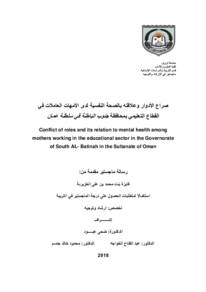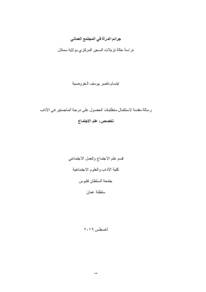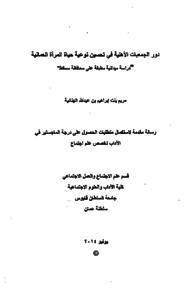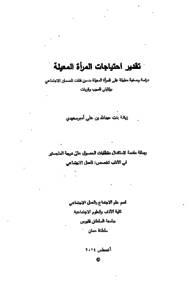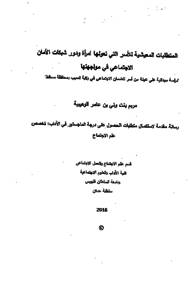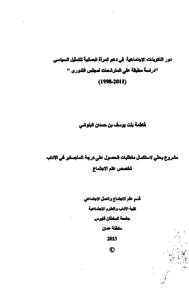Document
الأبعاد الاجتماعية لمشاركة المرأة العمانية في تنمية المجتمع العماني : دراسة ميدانية مقارنة بين المشاركات وغير المشاركات في الجمعيات الأهلية التطوعية.
Other titles
"The Social dimensions of women's participation for the development of Omani society" "A comparative field study among the participative and non- participative women of the voluntary civil associations"
Publisher
جامعة عين شمس.
Gregorian
2012
Language
Arabic
English abstract
As the role of women in Omani Introduction society has been a significant
change, the areas of women's participation in the development of society
expanded and it was opened new areas for her , this is because of her capabilities
and capacities that qualify them to contribute effectively in the new Omani
society in addition to the conviction of the government of the Omani women's
role and their ability of contributing in the development of society, as the formal
support to participation has opened up ground prospects for the participations,
that was prohibited before.
Importance of the study
This importance arsis for the fact that the role of woman is an important
indicator to know the degree of economic and civic depleopment in any society,
and in statistical view, women consider half of society.
So, her development help the socialization of the large number of women's
studies in Oman, the majority of them have focused on how women's access to
education and their contribution in official work, but they didn't focus on the
social participation of women, and the impact of the social dimensions of these
participation in all development's areas, besides to know the constraints and
challenges that face the Omani women their participation, and the different ways
to overcome these challenges.
Problem of the study:
This study sought to determine the impact of social factors and dimensions
of the Omani women beside their effect an Omani society's participation.
Besides, tasting the how Omani women effected by the variables that
occurred in the society, and its economic, political and cultural transformation,
˼˹̀
through tasting their contribution in the development and their formal / informal
participation in the whole political, economic and social life.
Objectives of the study
This study aimed to:
Ï- To identify the role of social and economic policies in change the status of
Omani women, especially in the positive or negative participation in the
development.
Ð- To detect the role of the social dimensions or factors educational, cultural,
economic, familiar and religious" in the positive or negative participation
in the development.
Ñ- To identify the participates roles "the sample" through the NGOs in the
development of society.
Ò- To detect the challenges that face the social participation of women "the
sample" in the development and the ways to eliminate them.
The questions of study:
Ï- What is the role of social and economic policies in change the status of
Omani women, especially in the positive or negative participation in the
development?
Ð- What is the role of social dimensions and factors "educational, cultural,
economic, familiar and religious" in the positive or negative participation
in the development?
Ñ- What are the roles of the participants "the sample" through the NGOs in
the development of society?
Ò- What are the challenges and problems that face the social participation of
women "the sample" in the development and the ways to eliminate them?
˼˹́
The methodology:
This study relied on the descriptive and analytical method in determining
the general framework of the study, to enable us to identify the role of social
factors in the women's participation in the social and voluntary work, as well as,
describing the challenges that face the social participation and the ways to
overcome them.
The researcher has conducted a field study on a sample of women of civil
associations, so she selected (ÏÎÎ) of them to make interviews, and conduct a
comparative study among them. That the were (ÓÎ) of them work without pay or
pay (volunteer and active) as well as (ÓÎ) of them didn't participate in any
associations, in order to get the maximum responses as possible.
The researcher take in consider the discrepancy between the vocabulary of
the sample in "the age, educational status, marital status, professional status,
economic status and cultural status –etc and their impact of the awareness as well
as the extent of their participation in the development.
And the researcher made personal interviews with the women leaders in the
civil associations, that she selected (Ó) of them as a volunteers and they contribute
to establish that associations, and they have grand experience in the field of social
and civil work, as well as they can do developmental activities or offer services to
particular categories.
• Tools of the study
• The study relied on different tools such as the case study, the interview of
women leaders
˼˹̂
The results:-
Ï- the different social factors (Age, marital status, educational level and the
average of income …etc) as well as the familiar, cultural and religions
status weren't obstacles to the participation, especially that the results of
field study appeared that there weren't significant differences between the
participants and in participants about these factors, in spite of the difficult
that face women because of their roles in the family or out, which
emphasizes the increasing of motivations of the participants to develop the
society.
Ð- There were no significant differences between participants or in
participants about the participation of the voluntary work through the
education levels (stages) ×× , ÖÕ , respectively.
Ñ- The half of participants work as volunteers (and ÕÓ of them participated
from (Ï ÏÎ) years that refer to the novelty of their participation, and ÓÔ
of them work in many associations, and ÒÔ of them said that were no
negative effect on the basic association, as well as ÕÓ of them gained
new experiences and self development by the personal relations, and ÐÎ
only work with little money that indicates to the impact of the moral side
of participation.
Ò- That ÒÐ of participants were practicing various charitable activities and
Ï× went to the activities of society development.
˼˺˹
Ó- The study showed that the religions factor was the first motivation for
participation ÓÎ , after that the tendency to human voluntary work ÑÓ ,
and ×Î of participants have a friendship and brother hood relationships
within the associations.
Ô- That ÔÔ of participants confirmed that there were no difficulties in
reconciling between their roles in sides or outside the associations, which
indicates the self – confidence and the desire to charitable work, despite
that ÑÕ Ó of them said that there were familiar obstacles preventing their
participation.
Õ- The most significant gains to participants related to the religious and self
or social factor ÖÎ , in the other hand Ð Ó only referred to the
increasing of awareness, about the importance of participation, this mean
that the voluntary work was still related to the religious and charitable
motivations.
Ö- The study showed that ÔÏ ÖÎ of in participants said that they didn't
participate because of the familiar factor, and ÏÔ because the women
themselves.
×- That ÒÏ of in participants emphasize that they will not participate in any
civil association, but ÐÐ of them answered that they want to access to
specific areas of civil associations.
Recommendations of the study
˼˺˺
Ï- There must be further studies in the field of participating in civic
associations, as lacking academic interest in this area, in spite of the
importance of its role in society. The topics that can be studied in this field.
The value of volunteerism, the problems of volunteering work and the
future of volunteering work in the Omani society as well as identify
cultural tends for citizens to promote volunteering work for women in
Omani society.
Ð- Adopt a new vision to motional rector to transform the idea in which work
based on charity to the structural role of associations that related to the
whole development.
Ñ- The religious institutions should link participation to the development
through the religious discourse that it is a social obligation to those they
can do it.
Ò- It should identify the problems and obstacles that face participants, either
they connected to financial means, the work in different activities or that
may related to some cases of corruption in the national associations, as well
as the administrative and bureaucratic obstacles of they face.
Ó- It should be given in consider women in general, and participants
particularly through identify the positive or negative role; factors in
development either in different fields or national work field.
Ô- Educational institutions should put the topic of developmental and national
work in different study methods.
Õ- It should integrate new activities and fields within the national associations,
as well as it is important to see the other countries experiences in the field
of civil work and the effect role of women in it.
˼˺˻
Ö- It should provide a strong cooperation between NGOs and official
institutions in the field of drawing policies, put plans and participating in
programs implementation and supervision.
×- It should find money sources to funding and inviting the private sector to
contribute in support of NGOs, in all forms and ways.
ÏÎ- It should encourage NGOs to join the international and Arab federations
that related to money activities and fields.
ÏÏ- It is important to urge the associations to evaluate permanently their aims,
activities and methods of work, as well as their ability to keep up the
movements, including always provide database to the workers and clients
as well as other aspects.
Finally, this study was divided into seven chapters:
Ï- The first chapter dealt with the main concepts and the previous studies.
Ð- The second included the theoretical trends to discuss the role of women in
the development through five models.
Ñ- The third discussed the role of Arab women in the development in Arab
world through six Arab countries, as well as the role of women
volunteers.
Ò- The fourth include the role of Omani Oman in the development,
particularly through volunteer work.
Ó- In the fifth, the researcher show the field study and the methodology.
Ô- The sixth chapter dealt with analysis of data and put conclusions.
Õ- Finally, the seventh dealt with the discussion of results, the general
results of study and at last the recommendations and suggestions.
Description
في الأصل رسالة ماجستير للمؤلفة من جامعة حلوان
Member of
Same Subject
